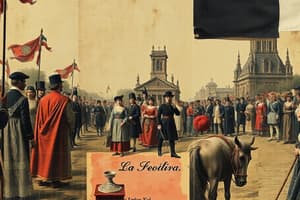Podcast
Questions and Answers
Which of the following factors, when combined, most directly triggered the convening of the Estates General in 1789?
Which of the following factors, when combined, most directly triggered the convening of the Estates General in 1789?
- Enlightenment ideals influencing the Third Estate and King Louis XVI's personal popularity.
- Excessive taxation of the Third Estate and the monarchy's lavish spending habits. (correct)
- Widespread famine and the desire to expand France's territorial holdings.
- The clergy's demand for greater political power and the nobility's resistance to social reforms.
How did the social structure of pre-revolutionary France contribute to the widespread dissatisfaction among the Third Estate?
How did the social structure of pre-revolutionary France contribute to the widespread dissatisfaction among the Third Estate?
- By exempting the Third Estate from taxation, thus alleviating their financial burdens.
- By promoting social mobility, allowing members of the Third Estate to easily ascend into the higher estates.
- By ensuring equal representation and opportunities for all citizens regardless of their estate.
- By perpetuating a system of inequality where the nobility and clergy enjoyed privileges while the commoners faced heavy burdens. (correct)
What was the most significant consequence of the execution of King Louis XVI during the French Revolution?
What was the most significant consequence of the execution of King Louis XVI during the French Revolution?
- It marked a turning point towards the establishment of a republic and the end of absolute monarchy in France. (correct)
- It resulted in an alliance between France and other European monarchies, strengthening France's international position.
- It immediately restored peace and stability to France, ending the Reign of Terror.
- It solidified the power of the monarchy, reinforcing the divine right of kings.
How did the Reign of Terror, initiated by the Jacobins, contradict the initial ideals of the French Revolution?
How did the Reign of Terror, initiated by the Jacobins, contradict the initial ideals of the French Revolution?
Which of the following best describes the relationship between the Taille and the Third Estate's grievances?
Which of the following best describes the relationship between the Taille and the Third Estate's grievances?
How did Napoleon Bonaparte's rise to power reflect both the continuation and the departure from the ideals of the French Revolution?
How did Napoleon Bonaparte's rise to power reflect both the continuation and the departure from the ideals of the French Revolution?
Which statement accurately describes the long-term impact of the French Revolution on European societies?
Which statement accurately describes the long-term impact of the French Revolution on European societies?
What role did Enlightenment ideals play in shaping the causes and objectives of the French Revolution?
What role did Enlightenment ideals play in shaping the causes and objectives of the French Revolution?
Flashcards
The Three Estates
The Three Estates
The three divisions of French society: clergy, nobility, commoners.
Taille
Taille
A land tax that burdened the common people in France.
Estates General
Estates General
A representative assembly from the three estates, convened to address crises.
Reign of Terror
Reign of Terror
Signup and view all the flashcards
Execution of King Louis XVI
Execution of King Louis XVI
Signup and view all the flashcards
Living Conditions Before the Revolution
Living Conditions Before the Revolution
Signup and view all the flashcards
Consequences of the Revolution
Consequences of the Revolution
Signup and view all the flashcards
Liberty, Equality, Fraternity
Liberty, Equality, Fraternity
Signup and view all the flashcards
Study Notes
The French Revolution: Causes, Events, and Consequences
- The French Revolution was a period of major political and social change in France
- It involved the people challenging the existing social order
- It aimed to create a fairer society
The Three Estates
- French society was divided into three estates: clergy, nobility, and commoners
- The First Estate was the Clergy
- The Second Estate was the Nobility
- The Third Estate included peasants and commoners
Taxation and Unrest
- French people faced heavy taxation, especially the Third Estate
- The Taille (land tax) was a significant burden on the Third Estate
- Growing dissatisfaction and demands for reform among the commoners
The Estates General
- The Estates General was a representative body of the three estates
- It was convened by King Louis XVI in 1789 to address the economic crisis
- It was meant to address the crisis in France
Causes of the French Revolution
- Bad harvests and rising prices: Led to widespread hardship
- Desire for social change: The Third Estate demanded equality and an end to the privileges of the nobility and clergy
Events of the French Revolution
- The king was executed
- The Reign of Terror which was a violent period under the Jacobins
Studying That Suits You
Use AI to generate personalized quizzes and flashcards to suit your learning preferences.
Related Documents
Description
Explore the French Revolution, a period of political and social change in France. It involved the people challenging the social order, aiming for a fairer society. Learn about the three estates, taxation, dissatisfaction, and the Estates General.




